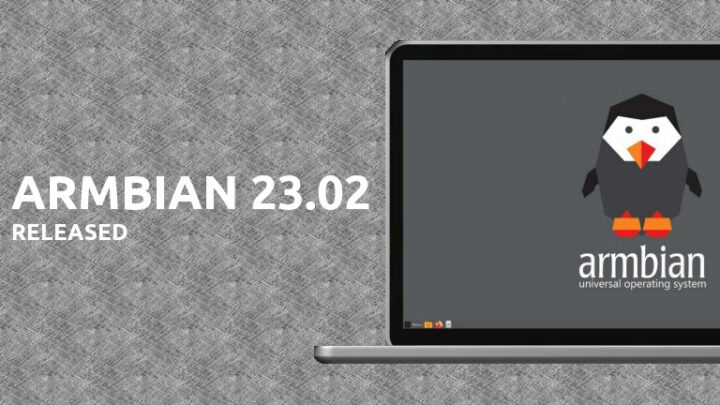Two of the most popular projects providing images for Arm and RISC-V single board computers have released new updates with Armbian 23.02 adding Linux 6.1-based Debian and Ubuntu images, and DietPi 8.14 adding experimental RISC-V support for the StarFive VisionFive 2 SBC and new Arm boards.
Armbian 23.02 Quoll
Linux 6.1 is the latest LTS kernel, so Armbian is now providing Ubuntu 22.04 Jammy and Debian 11 Bullseye images based on Linux 6.1.y for boards that support it, as well as the first development images based on Debian 12 Bookworm and Ubuntu 23.04 Lunar.
I could not find any new boards added in the changelog, but the release brings several improvements and bug fixes to some of the already supported SBCs including the Raspberry Pi 3, Orange Pi R1 Plus LTS, ROCK Pi S, ROCK Pi 4, NanoPi R2S, NanoPi NEO3, and Banana Pi BPI-M2 Pro. The announcement also highlights that Armbian OS works well on RK3588 with official support for Radxa Rock 5 and Orange Pi 5, albeit some are still using Linux 5.10.x.
The Armbian 23.02 is the last release based on the legacy framework, as the next release will rely on a complete rework of the build framework that took two years to complete and is said to bring significant improvements such as an “advanced but simple-to-use logging system”, better use of caching, and more. The Armbian build system is supposed to work on all common architectures and operating systems including WSL2.
You’ll find the latest images for your board on the download page.
DietPi 8.14
DietPi is a lightweight Debian-based Linux distribution for SBCs and server systems with the option to install desktop environments. The latest DietPi 8.14 was released earlier this month with brand new support for the Orange Pi 5, new images for ODROID-N2/C4/HC4 based on petitboot SPI bootloader enabling USB boot, as well as experimental RISC-V support for the StarFive VisionFive 2 SBC, while the Rock 5B got a “bugfix” image using EXT-4 instead of the FAT file system.
Other changes include DietPi-Config network settings improvements, LetsEncrypt works with HTTP/2 on Apache, an updated version for Gogs, and fixes for Rock Pi S, Rock Pi 4, DietPi-Drive_Manager, Docker, Owncloud/Nextcloud, myMPD, X11, Amiberry, and Synapse. Additional changes can be found in the release notes.
The source code is hosted on GitHub, and you can download an image for your board from the project’s website.

Jean-Luc started CNX Software in 2010 as a part-time endeavor, before quitting his job as a software engineering manager, and starting to write daily news, and reviews full time later in 2011.
Support CNX Software! Donate via cryptocurrencies, become a Patron on Patreon, or purchase goods on Amazon or Aliexpress. We also use affiliate links in articles to earn commissions if you make a purchase after clicking on those links.







Armbian guys deserve a medal.
+1
It seems that the software support is approaching Raspberry Pi OS’s level little by little.
Still no distro love for the D1S boards.
Mainline kernel code is now queued up for the 6.3 merge.
The Intel, AMD, Gaming plus Desktop OS causing interest is Chimera0S
ChimeraOS is an operating system that provides an out of the box couch gaming experience. After installation, boot directly into Steam Big Picture and start playing your favorite games.
If you want Steam in your living room, you want ChimeraOS.
Wonder if it ever gets to Arm.
Eta prime likes the combination of gaming and desktop.
What is this non-sequitor rubbish?
Software people are actually interested in, not force feed.
For a UK guy, I was sort of expecting a reply in English.
Good old kicking the player not the ball.
The problem is that you didn’t bring a ball. You started this with a completely off topic post and failed to address how it’s relevant to this discussion.
Force fed? Everyone reading this post chose to based on their interest in the websites editorial decisions and the title and excerpt of the post.
You, on the other hand, are trying to subvert that choice by pushing your sub-coherent, off-topic comments in front of people.
ChimeraOS has made some design decisions which IMHO limit its future potential going forward. For one thing they have only just now added the ability to mount USB drives and network drives for the included KODI in their system.
If gaming is what you’re interested in Batocera Linux is a much better system which also works on both X86/64 and ARM hardware. If you’re an ETA Prime guy you’re probably already aware of it.
No Chimera wont be coming to Arm any time soon.
1) Steam is x86 linux only, x86 to Arm converters exist on linux like Box86 but are still a work in progress, old games and simple 2D/3D games do work.
3) Even if the above matures you need a high performance CPU and GPU plus good open source OpenGL/Vulkan drivers to be able to handle the full Steam library.
The best OpenGL/Vulkan drivers that are open source and fully featured are AMD GPU’s, the GPU’s built into Arm Soc’s are a mixed bag of features/driver support when it comes to open source.
On top of that to use AMD GPU’s you basically need an Arm system ready platform which is their bios/UEFI equivalent to x86.None of the linux SBC’s are Arm system ready and of the systems out there most are targeted not at home users but business/industrial.
Check out Wooty B on Youtube, he has an Arm SR system meant for workstation development with a PCIe AMD GPU running AAA PC games via Debian+Box86.
It’s a glimpse of what’s possible but without a company making consumer linux Arm SR PC’s along with a team of software devs behind it the likes of small Arm PC Steam game console are fantasy.
Of course Qualcomm and MS have their own Arm PC standard but most of the linux scene dont seem to care about those latops instead focusing on Apple Arm.